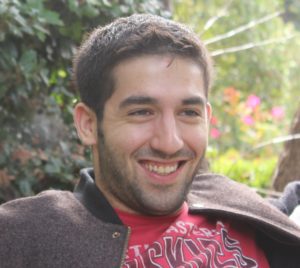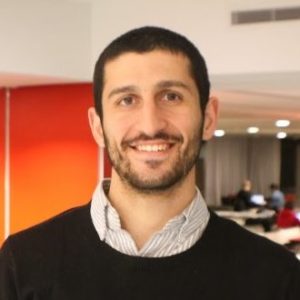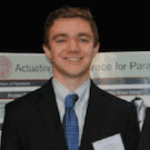Every spring, Jewish Studies minors and other interested students participate in the Jewish Studies Module, a unique capstone seminar that gives students the opportunity to bring together their major fields with their interest in Jewish Studies through an independent project.
This year, Module participants engaged in four fascinating projects.
Zach Corenblum, a History major and Jewish Studies minor graduating this spring, focused on the children of Jews who had immigrated to the United States from the former Soviet Union. All of the young adults with whom he spoke had found themselves profoundly influenced by their parents’ immigration experiences, especially in their ideas about work ethic and in their strong ties to Russia and Russian culture. A budding photographer, Corenblum combined striking portraits of his subjects, composed to reflect some aspect of their immigration story, with a framing narrative.
Nadav David, a Finance major with minors in Jewish Studies and Social Entrepreneurship, explored the rapidly expanding arena of Jewish Innovation and Social Entrepreneurship. Jewish social entrepreneurship, he found, spans a wide gamut, from largely self-sustaining ventures to those that rely mostly on grants and donations, and from organizations devoted to social services to those focused more specifically on Jewish identity and engagement. This “ecosystem” is supported by a robust infrastructure, including accelerators and leadership programs, a variety of mechanisms for engaging funders, and research and consulting operations. Challenges remain, however, including a disconnect between accelerators and funders and a lack of viable and sustainable business models. David concluded with his own thoughtful recommendations for addressing these challenges.
Alex Matathia, a Mechanical Engineering major, investigated the renewable energy industry in Israel. Despite its high potential for large-scale solar energy production and its goal of generating 5% of its energy from renewables by 2016 and 10% by 2020, he learned, Israel currently gets less than 2% of its energy from renewables. A discovery of natural gas in 2009 has slowed development, but Matathia found that poor planning and a burdensome regulatory process have also been significant obstacles. He recommends that Israel loosen its rigid energy policy, enabling better planning and coordination between industries; support increased private sector innovation; and invest considerably in large-scale solar power plants.
Greg Berson, a Criminal Justice major, investigated the responses of the Israeli Supreme Court to home demolitions in the West Bank. Over 28,000 homes have been demolished in the West Bank, East Jerusalem, and Gaza since 1967. Some of these demolitions are of homes of suspected terrorists, and are either conducted punitively after an attack or as precautions in an effort to prevent an attack. Others are done because a home lacks the necessary permits. A variety of international and domestic laws pertain to home demolitions conducted by the Israel Defense Forces (IDF). Berson found, however, that the Supreme Court applies international law selectively when it comes to home demolitions; to be consistent with its rulings in other arenas, he argues, it would need to abolish both precautionary and punitive home demolitions.
Please join us in congratulating our 2016 graduates.
Read the rest of the Spring 2016 Haverim Newsletter here.







